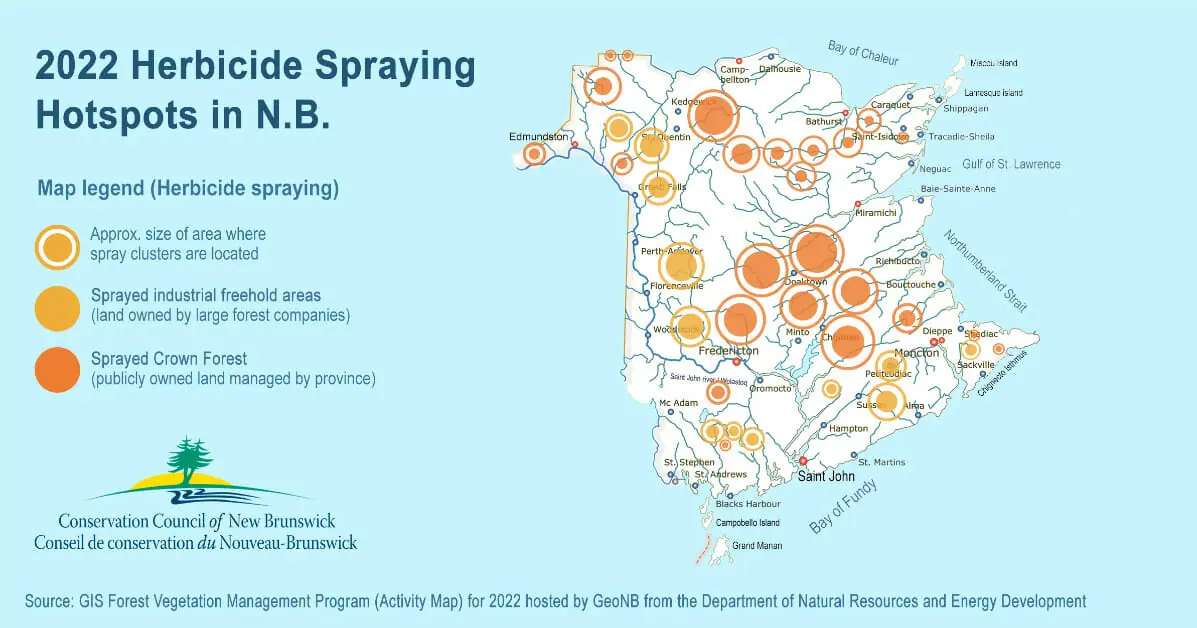Take Action Against Glyphosate
By Community Forests International, Posted on July 2, 2022
Community Forests International is firmly against spraying glyphosate on forestland and we ask you, our community, to voice your opposition.
Glyphosate is used to suppress hardwood tree species that compete with industry-favoured softwood species. It is one of several forest management practices that is limiting our forest composition—eliminating the diversity that is critical to the long-term climate resilience of the Wabanaki forest here in the Maritimes.
Forests can be one of our greatest assets as we adapt to and mitigate climate change, but we need to support the natural diversity of the Wabanaki forest. Forests that lack diversity often act as a source of carbon emissions; they are more vulnerable to insect attacks, drought stress, and other disturbances that cause them to degrade even more rapidly, releasing their stored carbon back into the atmosphere.
What’s more, glyphosate was listed as a probable carcinogen by the World Health Organization’s cancer research agency, the International Agency for Research on Cancer (IARC), in 2015. The sprayed lands affect community and ecosystem health well beyond the targeted spray zones. And from gathering berries to harvesting sweetgrass, glyphosate spraying is also negatively impacting traditional Indigenous lands and practices. Beyond the ecosystem and climate ramifications, glyphosate poses a serious risk to our collective community’s health and well-being.

Using data from the Government of NB, this map shows where New Brunswick forests will be sprayed with herbicides in 2022.
Speak up against glyphosate today.
Addressing the dual challenges of climate change and the biodiversity crisis requires restoring the complexity and diversity of our forests. Over 40 countries have already banned or severely restricted the use of glyphosate. We are calling on the Province of New Brunswick to put community health, ecosystem wellbeing, and climate action at the forefront of their decision-making by banning the use of glyphosate on public forests.
You can help take a stand against glyphosate by using the Conservation Council of New Brunswick’s letter-writing tool to express your opposition to spraying Crown forests.
Resources:
David A Etheridge, David A MacLean, Robert G Wagner, and Jeremy S Wilson. Changes in landscape composition and stand structure from 1945–2002 on an industrial forest in New Brunswick, Canada. Canadian Journal of Forest Research. 35(8): 1965-1977. https://doi.org/10.1139/x05-110
Josh Noseworthy and Thomas M. Beckley. Borealization of the New England – Acadian Forest: a review of the evidence. Environmental Reviews. 28(3): 284-293. https://doi.org/10.1139/er-2019-0068
Learn More:
Make Room for Change | Conservation Council of New Brunswick
Glyphosate spraying in N.B. akin to ‘eco-genocide,’ Indigenous communities say | Canada’s National Observer
New research aims to uncover long-term effects of glyphosate spraying on forests | The Narwhal
Green MP pushes for ban on popular herbicide | Canada’s National Observer
